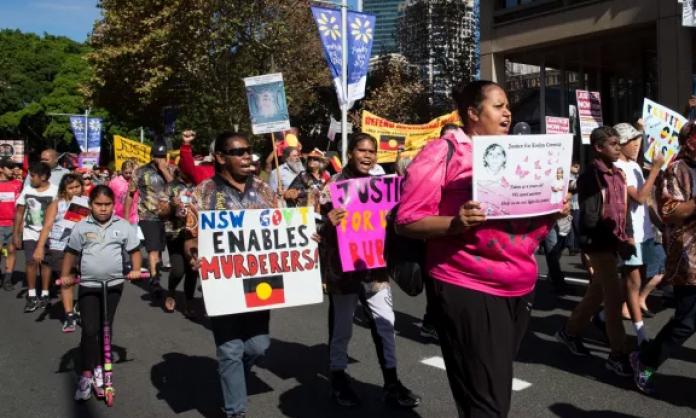Thursday 13 September 1990 was the day my cousin, Colleen Walker-Craig, was last seen in Bowraville, New South Wales. Thursday 13 September 2018 was the day the NSW Court of Criminal Appeal reduced her life, and that of Evelyn Greenup and Clinton Speedy-Duroux, to a few lines of legal jargon. “No retrial” was the response in layman’s terms.
Our families have been fighting for justice for 28 years. And my experience in court on that Thursday tells me things haven’t changed. The state racism our families faced in the 1990s and 2000s – the racism that let a serial killer walk free because the victim was Aboriginal – has not gone away.
It started well before I set foot in the courtroom. The morning of the judge’s decision, our families met with the state’s legal team for a pre-decision briefing. While the well-dressed figures in the room went through the basics of how the day would unfold, I couldn’t help noticing how lavish the place was.
Gold trimmings on the walls, beautifully crafted pillars in the centre of the room and three judges’ gowns encased behind thick glass at the front. It seemed to form the edge of an ever tightening circle of state officials and bureaucrats around our families as we sat in the centre. They were like vultures not daring to show emotion – cold, calculated living embodiments of the “neutrality” the system purports to uphold.
It was clear why we were there, though it’s been something I have grappled with for a while but could never understand until recently. Underpinning the court’s lavishness, its officialdom, its “protocols”, is the idea that, as ordinary people seeking justice, we have to play by their rules. This is their domain, their playground.
The judges went to prestigious universities, played sports with top politicians – so they decide what constitutes “fresh and compelling evidence” and what doesn’t. This is their house, and we must respect their every word. They are like the cardinals of the old feudal world, the prophets of justice in an unjust society.
As the day went on and we moved into the courtroom, my stomach tightened. If you thought the break room was fit for a king, in this courtroom you’d be forgiven for thinking the judges descended from heaven. “Tap, tap, tap” – my interest in modern architecture was interrupted by a young man in a gown calling “Please rise” blah blah blah. The ridiculousness of judges having their own personal stick-tapper to introduce them was almost the final straw for me.
We all stood, heads bowed, paying respect to an institution that never respected us. The judges sat and the decision was read out. The next 10 minutes were an emotional roller-coaster. Not because the judge was animated in any way – he was as dull as they all are – but because the legal jargon was so confusing it was hard to keep up.
Did we have the retrial? Did we not? Who the fuck knew? The decision was read out, and only then did the people in the room grasp what had just happened. Our family was denied justice on a technicality. I would discover later that, due to the bureaucratic terminology of the decision, family in Coffs Harbour attending via video link didn’t even know what had happened.
Reality kicked in; shock is the only way to describe the mood in those first moments. Shock at how the judges gracefully floated into the room, kicked us in the guts and floated out as if nothing had happened. Shock at how such a decision could be made – after all the evidence, after our family has waited 28 years for justice precisely because of the racism of the courts and police that said our kids’ lives did not matter. It’s 2018, and many people say we’ve come far – clearly not.
The rally
That shock turned to anger. So we did what our family does best, we called a protest! Within a week, we pulled together solidarity from all parts of NSW – from Port Macquarie to Lismore and out west, several people messaged in to see how they could help.
It was amazing, an outpouring of solidarity from ordinary people with the plight of our families. It was a ray of sunshine compared to the blocked doorways we keep getting from the state government – which would be bending over backwards to catch a serial killer if our kids were white.
Rallies kicked off in the main street of Tenterfield, Bowraville and outside the NSW parliament. In Bowraville, the local papers reported that 300 people turned up to join our families – a great outcome for the Nambucca Valley, which is known more for its sleepy spring days than fiery protests.
The last protest in Bowraville was in the 1990s, organised by my family in response to the racism of local police in “dealing” with the murders. What I can’t seem to shake is that our families have had to fight tooth and nail to be treated equally to other Australian citizens. If your family member is murdered, you expect a full and serious investigation. Our community was robbed of that in the 1990s and we are still being denied to this day.
But in the face of such overt racism and injustice, we continue to fight. It’s because our family are fighters – we’ve gone this far, all the way to the High Court by the looks of it. We will not give up now. And we are not alone. The turnout to our protests shows there are hundreds if not thousands of people around the country willing to stand with us in our fight for justice. And as long as we keep fighting, they are with us.
We will continue to fight, and I urge those who support us to keep their ears out for the next time we take the streets screaming “Justice for Bowraville!”








